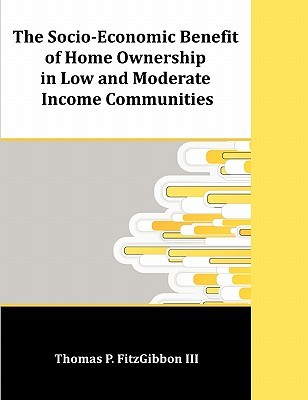
- We will send in 10–14 business days.
- Author: Thomas P Fitzgibbon
- Publisher: Dissertation.Com
- Year: 2010
- Pages: 148
- ISBN-10: 1599423626
- ISBN-13: 9781599423623
- Format: 18.9 x 24.6 x 0.8 cm, minkšti viršeliai
- Language: English
- SAVE -10% with code: EXTRA
The Socio-Economic Benefit of Home Ownership in Low and Moderate Income Communities (e-book) (used book) | bookbook.eu
Reviews
Description
The United States government spends billions of dollars on home ownership programs in low and moderate income communities. However, there is paucity of academic research to assess the socioeconomic impacts of these programs. The purpose of this empirical research was to assess their possible impacts. The key research question explored the relationship between low and moderate income home ownership, the independent variable, and the dependent variables of the rates of crime, unemployment, high school graduation, and standardized test scores in the communities concerned. The research design was quantitative-causal. Welfare economic theory formed the theoretical foundation for the study. Using public records, data were collected from four low and moderate income communities in major Midwestern metropolitan areas. The proposed relationships were tested through independent sample t-tests and regression analyses. Results indicated no significant relationship between low and moderate home ownership rate and the rates of the studied socioeconomic indicators. A significant social change implication of this finding would be to relocate federal dollars from housing schemes to more socially and economically relevant programs, such as those geared toward improving educational opportunities in low and moderate income communities.
EXTRA 10 % discount with code: EXTRA
The promotion ends in 22d.16:01:07
The discount code is valid when purchasing from 10 €. Discounts do not stack.
- Author: Thomas P Fitzgibbon
- Publisher: Dissertation.Com
- Year: 2010
- Pages: 148
- ISBN-10: 1599423626
- ISBN-13: 9781599423623
- Format: 18.9 x 24.6 x 0.8 cm, minkšti viršeliai
- Language: English English
The United States government spends billions of dollars on home ownership programs in low and moderate income communities. However, there is paucity of academic research to assess the socioeconomic impacts of these programs. The purpose of this empirical research was to assess their possible impacts. The key research question explored the relationship between low and moderate income home ownership, the independent variable, and the dependent variables of the rates of crime, unemployment, high school graduation, and standardized test scores in the communities concerned. The research design was quantitative-causal. Welfare economic theory formed the theoretical foundation for the study. Using public records, data were collected from four low and moderate income communities in major Midwestern metropolitan areas. The proposed relationships were tested through independent sample t-tests and regression analyses. Results indicated no significant relationship between low and moderate home ownership rate and the rates of the studied socioeconomic indicators. A significant social change implication of this finding would be to relocate federal dollars from housing schemes to more socially and economically relevant programs, such as those geared toward improving educational opportunities in low and moderate income communities.


Reviews